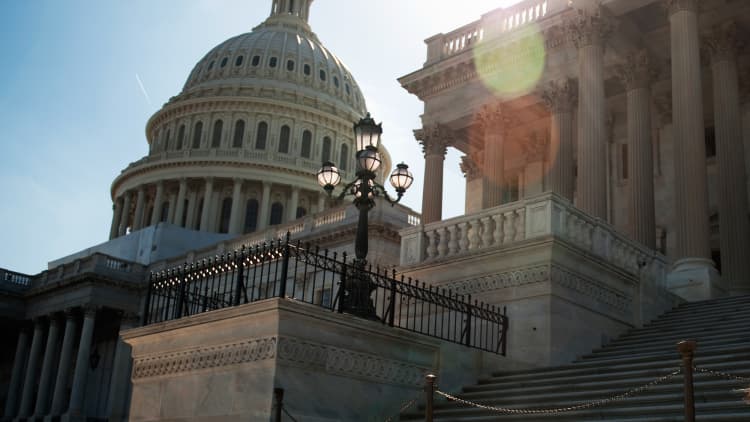Mark Zuckerberg, chief executive officer and founder of Facebook Inc., arrives for a House Financial Services Committee hearing in Washington, D.C., Oct. 23, 2019.
Andrew Harrer | Bloomberg | Getty Images
Facebook and Amazon led the Big Tech companies in lobbying spend in the first quarter of 2020, according to documents filed with the federal government this week. Facebook ramped up spending 19% from last quarter to $5.3 million, while Amazon spent 3% more than last quarter at $4.3 million.
Meanwhile, Google scaled back its spend 34% compared to last quarter, reporting $1.8 million in lobbying expenses. Google had already begun cutting down its lobbying operation last year and shaking up its global government affairs and policy operations, firing about half a dozen firms representing about half of its lobbying bill last year, according to The Wall Street Journal.
Here’s the breakdown of Big Tech lobbying spend in the first quarter:
The new tally comes as the coronavirus pandemic has rocked businesses in every industry and made many workers more reliant on the internet than ever. In recent weeks, the companies participated in calls with the federal government, and Google and Apple have pitched into efforts to trace the spread of the virus through a new partnership.
Tech companies seem to be gaining back some goodwill that had been lost over the past few years due to privacy scandals and complaints from the start-up world about its competitive tactics. Facebook and Google are both subjects of antitrust investigations on the federal and state levels, and Amazon and Apple are both the frequent subjects of scrutiny, including from the Congressional antitrust probe. But the full effects the tech companies’ efforts in the coronavirus response on lobbying spend likely won’t be reflected until the next quarter’s filings.
Still, filings for Facebook, Apple and Amazon all mentioned that part of their efforts were related to issues around Covid-19. Amazon lobbied the federal government on issues related to combating price gouging and false claims about the virus as well as issues related to the federal stimulus bill. Facebook and Apple’s filings only mention that they lobbied on issues related to the coronavirus response. Microsoft also lobbied on the stimulus bill.
Facebook and Apple both kicked up spending most in the quarter, each doling out over 18% more than they did in the previous filing period. Both companies have been engaged in discussions with lawmakers and the Justice Department about encryption, which the companies argue is a key tactic to protect consumer privacy.
Several government officials have argued that encryption could shield child predators who use the internet to abuse their victims or spread exploitative material. The Justice Department has argued for the companies to allow for a way for law enforcement to gain access to encrypted devices and services with a court order, which tech companies argue would jeopardize the security of all users.
Last month, senators introduced a bipartisan bill tying protections of Section 230 of the Communications Decency Act to adhering to best practices for detecting and reporting child sexual exploitation materials to law enforcement. Section 230 protects platforms from liability for their users’ content. A tech trade group representing the big five tech companies slammed the new legislation as a way to outlaw end-to-end encryption, which the senators have denied.
Lobbying filings show the tech companies spending on many of the hot button topics that preceded the current crisis. Facebook lobbied the federal government on topics including encryption, content policy, federal privacy and political advertising legislation, worker visas and Section 230, among other topics. Apple lobbied on issues including patent law reform, counterfeit enforcement, trade agreements, competition and government requests for data.
Microsoft, which has received comparatively little scrutiny in recent years, spent $2.5 million on lobbying in the quarter, fairly consistent with previous quarters. Microsoft has been involved in an ongoing legal battle regarding a lucrative government defense contract it was awarded last year over Amazon, which was believed to be the favorite to win the $10 billion deal. Amazon has alleged the the Defense Department was biased in its review and asked for a new evaluation.
WATCH: How US antitrust law works, and what it means for Big Tech

